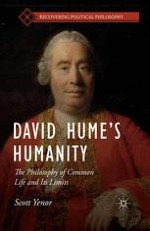2016 | Buch
Über dieses Buch
Scott Yenor argues that David Hume's reputation as a skeptic is greatly exaggerated and that Hume's skepticism is a moment leading Hume to defend common life philosophy and the humane commercial republic. Gentle, humane virtues reflect the proper reaction to the complex mixture of human faculties that define the human condition.
Anzeige
